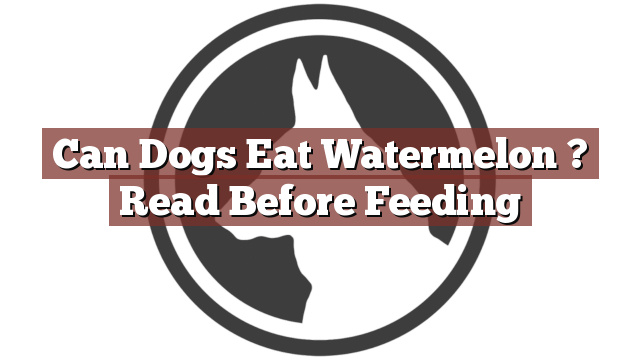Understanding Your Dog’s Dietary Needs
As a responsible pet owner, it is essential to be aware of your dog’s dietary needs. A well-balanced and nutritious diet is crucial for their overall health and well-being. While dogs primarily require a diet rich in protein, they can also benefit from certain fruits and vegetables in moderation. However, it is essential to exercise caution and conduct thorough research before introducing any new food into your dog’s diet.
Can Dogs Eat Watermelon? Read Before Feeding
Can dogs eat watermelon? This is a common question that many dog owners have. The answer is yes, dogs can eat watermelon, but it should be given to them in moderation and with certain precautions. Watermelon is a juicy and refreshing fruit that is packed with essential vitamins and minerals. It contains high levels of vitamin A, vitamin C, and potassium, which can provide several health benefits for your furry friend.
Pros and Cons of Feeding Watermelon to Dogs
Feeding watermelon to your dog can have both pros and cons. On the positive side, watermelon is a hydrating fruit that can help keep your dog’s body cool and prevent dehydration, especially during hot summer months. The high water content in watermelon can also aid in digestion and promote healthy bowel movements. Additionally, the vitamins and minerals present in watermelon can support your dog’s immune system and contribute to a shiny coat and healthy skin.
However, it is crucial to remember that watermelon should be given to dogs in moderation. Too much watermelon can lead to an upset stomach, diarrhea, or other gastrointestinal issues. Also, make sure to remove all the seeds and rind before feeding watermelon to your dog, as these parts can cause choking hazards or digestive complications. It is always a good idea to consult with your veterinarian to determine the appropriate portion size and frequency of watermelon intake for your specific dog.
Conclusion: Feeding Watermelon to Your Dog Safely
In conclusion, dogs can safely enjoy the occasional treat of watermelon. It is a healthy and refreshing fruit that can provide essential vitamins and minerals. However, it is crucial to feed watermelon in moderation and remove all seeds and rind. Always monitor your dog’s reaction after introducing any new food, including watermelon, and consult with your veterinarian if you have any concerns or questions about your dog’s diet. By understanding your dog’s dietary needs and making informed choices, you can ensure their health and well-being.
Thank you for taking the time to read through our exploration of [page_title]. As every dog lover knows, our furry friends have unique dietary needs and responses, often varying from one canine to another. This is why it's paramount to approach any changes in their diet with caution and knowledge.
Before introducing any new treats or making alterations to your dog's diet based on our insights, it's crucial to consult with a veterinarian about [page_title]. Their expertise ensures that the choices you make are well-suited to your particular pet's health and well-being.
Even seemingly harmless foods can sometimes lead to allergic reactions or digestive issues, which is why monitoring your dog after introducing any new food item is essential.
The content provided here on [page_title] is crafted with care, thorough research, and a genuine love for dogs. Nevertheless, it serves as a general guideline and should not be considered a substitute for professional veterinary advice.
Always prioritize the expert insights of your veterinarian, and remember that the health and happiness of your furry companion come first.
May your journey with your pet continue to be filled with joy, love, and safe culinary adventures. Happy reading, and even happier snacking for your canine friend!

